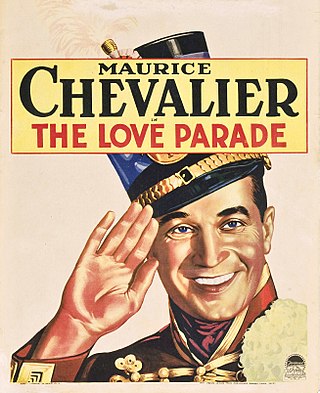
The Love Parade is a 1929 American pre-Code musical comedy film, directed by Ernst Lubitsch and starring Maurice Chevalier and Jeanette MacDonald, involving the marital difficulties of Queen Louise of Sylvania (MacDonald) and her consort, Count Alfred Renard (Chevalier). Despite his love for Louise and his promise to be an obedient husband, Count Alfred finds his role as a figurehead unbearable. The supporting cast features Lupino Lane, Lillian Roth and Eugene Pallette.

David Belasco was an American theatrical producer, impresario, director, and playwright. He was the first writer to adapt the short story Madame Butterfly for the stage. He launched the theatrical career of many actors, including James O'Neill, Mary Pickford, Lenore Ulric, and Barbara Stanwyck. Belasco pioneered many innovative new forms of stage lighting and special effects in order to create realism and naturalism.

The Legend of Hell House is a 1973 British gothic supernatural horror film directed by John Hough, and starring Pamela Franklin, Roddy McDowall, Clive Revill, and Gayle Hunnicutt. It follows a group of researchers who spend a week in the former home of a sadist and murderer, where previous paranormal investigators were inexplicably killed. Its screenplay was written by American author Richard Matheson, based upon his 1971 novel Hell House.
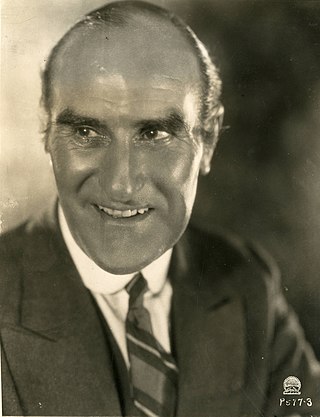
Ernest Torrence was a Scottish film character actor who appeared in many Hollywood films, including Broken Chains (1922) with Colleen Moore, Mantrap (1926) with Clara Bow and Fighting Caravans (1931) with Gary Cooper and Lili Damita. A towering figure, Torrence frequently played cold-eyed and imposing villains.

Dinner at Eight is a 1933 American pre-Code comedy-drama film directed by George Cukor from a screenplay by Frances Marion and Herman J. Mankiewicz, based on George S. Kaufman and Edna Ferber's 1932 play of the same title. The film features an ensemble cast of Marie Dressler, John Barrymore, Wallace Beery, Jean Harlow, Lionel Barrymore, Lee Tracy, Edmund Lowe, and Billie Burke.
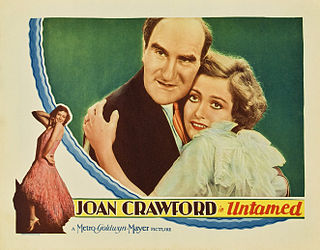
Untamed is a 1929 American pre-Code Metro-Goldwyn-Mayer romantic-drama film directed by Jack Conway and starring Joan Crawford, Robert Montgomery, Ernest Torrence, Holmes Herbert, Gwen Lee, and Lloyd Ingraham. The script was adapted by Sylvia Thalberg and Frank Butler, with dialogue by Willard Mack, from a story by Charles E. Scoggins.

Claudia Dell was an American showgirl and actress of the stage and movies.

Lionel Belmore was an English character actor and director on stage for more than a quarter of a century.

Bride of the Regiment is a 1930 American pre-Code musical film directed by John Francis Dillon and filmed entirely in Technicolor. The screenplay by Ray Harris and Humphrey Pearson is based on the book of the 1922 stage musical The Lady in Ermine by Frederick Lonsdale and Cyrus Wood, which had been adapted from the 1919 operetta Die Frau im Hermelin by Rudolph Schanzer and Ernst Welisch. The story is a remake of a 1927 First National silent film, The Lady in Ermine, that starred Corinne Griffith. It was later remade by 20th Century-Fox as That Lady in Ermine (1948) starring Betty Grable and Douglas Fairbanks Jr.

I Cover the Waterfront is a 1933 American pre-Code romantic drama film directed by James Cruze and starring Ben Lyon, Claudette Colbert, Ernest Torrence, and Hobart Cavanaugh.
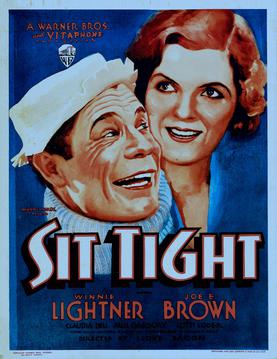
Sit Tight is a 1931 American Pre-Code musical comedy film, directed by Lloyd Bacon, written by Rex Taylor, edited by James Gibbon, and produced and distributed by Warner Bros. It was originally intended as a full musical, but due to the backlash against musicals, all the songs were cut from the film except for one – sung by Winnie Lightner – in all release prints in the United States.

Raffles is a 1930 American pre-Code comedy-mystery film produced by Samuel Goldwyn. It stars Ronald Colman as the title character, a proper English gentleman who moonlights as a notorious jewel thief, and Kay Francis as his love interest. It is based on the play Raffles, the Amateur Cracksman (1906) by E. W. Hornung and Eugene Wiley Presbrey, which was in turn adapted from the 1899 short story collection of the same name by Hornung.
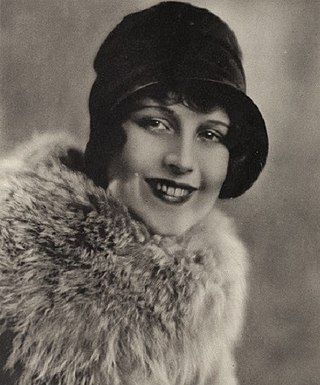
June Collyer was an American film actress of the 1920s and 1930s.
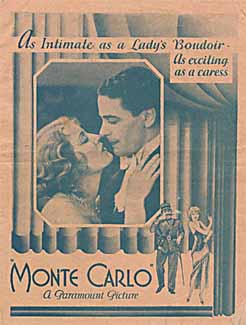
Monte Carlo is a 1930 American pre-Code musical comedy film, directed by Ernst Lubitsch. It co-stars Jack Buchanan as a French Count Rudolph Falliere masquerading as a hairdresser and Jeanette MacDonald as Countess Helene Mara. The film is notable for introducing the song "Beyond the Blue Horizon", which was written for the film and is first performed by MacDonald and a chorus on the soundtrack as she escapes on the train through he countryside. Monte Carlo was hailed by critics as a masterpiece of the newly emerging musical film genre. The screenplay was based on the Booth Tarkington novel Monsieur Beaucaire.

The Girl of the Golden West is a 1938 American musical Western film adapted from the 1905 play of the same name by David Belasco, better known for providing the plot of the opera La fanciulla del West by Giacomo Puccini. A frontier woman falls in love with an outlaw.

Jane Eyre is a 1934 American romantic drama film directed by Christy Cabanne, starring Virginia Bruce and Colin Clive. It is based on the 1847 novel Jane Eyre by Charlotte Brontë, and is the first adaptation to use sound.
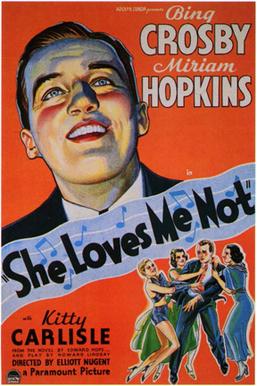
She Loves Me Not is a 1934 American comedy film directed by Elliott Nugent and starring Bing Crosby and Miriam Hopkins. Based on the novel She Loves Me Not by Edward Hope and the subsequent play by Howard Lindsay, the film is about a cabaret dancer who witnesses a murder and is forced to hide from gangsters by disguising herself as a male Princeton student. Distributed by Paramount Pictures, the film has been remade twice as True to the Army (1942) and as How to Be Very, Very Popular in (1955), the latter starring Betty Grable.

Agnes Mary Frances Castle was a Victorian era Irish author who worked with both her sisters and husband. The stories that she co-wrote were the basis of several plays and films.
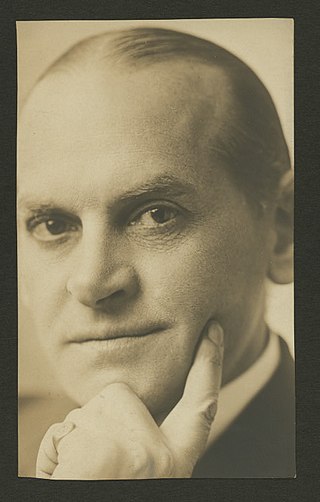
Francis Henry Westerton was a British stage and silent film actor of the 19th and early 20th centuries who carved a successful career on Broadway from 1905 to 1922.

Sweet Kitty Bellairs is a play in a prologue and four acts by David Belasco. It is based on the novel The Bath Comedy (1900) by married writing team Agnes and Egerton Castle. The work premiered at the Lafayette Square Opera House in Washington D.C. on November 23, 1903. The production transferred to Broadway; opening at the Belasco Theatre on December 9, 1903. A success, it ran there for a total of 204 performances; closing on June 4, 1904. The production starred Henrietta Crosman in the title role. Others in the cast included Katherine Florence (1874–1952) as Lady Standish, John E. Kellerd (1862–1929) as Lord Standish, Edwin Stevens as Colonel Villiers, Charles Hammond as Lord Verney, and Mark Smith as the Master of Ceremonies among others.




















